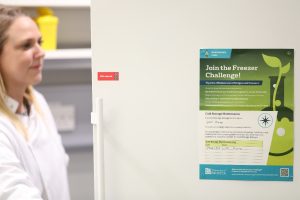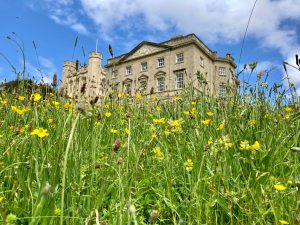 STEM buildings are responsible for 40% of the University’s energy consumption, and the numerous freezers in labs contribute to this figure. A single ultra-low temperature freezer (ULT) can use as much energy as an average household each day. Ways to reduce the energy consumption of freezers that were encouraged by the challenge include defrosting freezers, vacuuming freezer coils, creating a cold storage inventory, space sharing, using room temperature storage whenever possible and adjusting ULT temperatures from -80°C to -70°C.
STEM buildings are responsible for 40% of the University’s energy consumption, and the numerous freezers in labs contribute to this figure. A single ultra-low temperature freezer (ULT) can use as much energy as an average household each day. Ways to reduce the energy consumption of freezers that were encouraged by the challenge include defrosting freezers, vacuuming freezer coils, creating a cold storage inventory, space sharing, using room temperature storage whenever possible and adjusting ULT temperatures from -80°C to -70°C.
From January to July of this year, the Bristol Bioresource Laboratories demonstrated a commitment to more sustainable research by competing in and then winning an award in the 2022 Freezer Challenge. The challenge, run by My Green Lab and the International Institute for Sustainable Laboratories, aims to achieve greater energy efficiency, sample integrity and access and cost savings all while promoting best practices in cold storage management. This year’s challenge saved a total of 6.732 metric tons of carbon, with 1,200 labs from 27 countries taking part, the highest recorded number of participants yet!

The Bioresource Labs from Bristol Medical School won the award for the best ‘medium size lab’ within the Academic Sector Category and in doing so saved on average 283.4 kWh/day, an amazing saving for the lab and the University as a whole! Their dedicated efforts included defrosting 53 freezers, cleaning the filters of 39 freezers, retiring 4 ULT freezers and replacing them with energy-efficient models and fully auditing 51 freezers (49 of which were ULT models).
The Bristol Bioresource Labs will be awarded their certificate at the IS2L conference and will be featured in Lab Manager Magazine. When asked about whether they would participate in the 2023 challenge the said they would aim for the Winning Streak Award, given to labs that beat their energy savings from the year before.
We look forward to seeing if the Bristol Bioresource Labs achieve their goal, if you want to join the Bioresource labs in the 2023 Freezer Challenge register your interest here!

